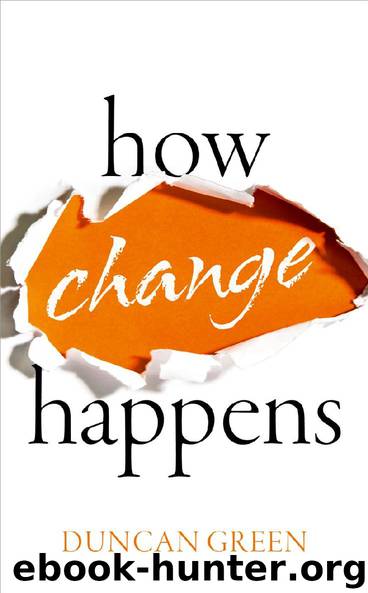How Change Happens by Duncan Green

Author:Duncan Green [Green, Duncan]
Language: eng
Format: epub
ISBN: 9780191088360
Publisher: OUP Oxford
Published: 2016-10-26T22:00:00+00:00
7
How the International System Shapes Change
‘Shame!’ roared the bearded activist, pointing an accusing finger as, uncomfortably besuited, I wended my way through the police lines. Attending an international trade conference as a civil society delegate was supposed to be a routine induction to CAFOD’s work in international institutions. However, the 1999 WTO ministerial in Seattle was anything but routine. Trapped between tear gas spraying robocops and enraged protesters, we NGO lobbyists from the UK had to take refuge with the British government delegates in their swanky conference centre offices. And that proved a great chance to build relationships and trust. It probably wasn’t what my placard-wielding accuser intended, but as it turned out he was very helpful.
For me Seattle marked the beginning of several years of lobbying on global trade rules. Working alongside government delegations from Pakistan, the Philippines, and many other countries, plus a plethora of fellow NGO policy wonks and academics, provided me with a great introduction to the complex dynamics of the international system, and how activism interacts with events, long-term trends, and shifts in norms and ideas.
The key event in those years was the 9/11 attack on New York’s World Trade Center, which took place just weeks before the WTO ministerial that followed the debacle in Seattle. Jittery delegates in Doha flinched whenever planes flew near the conference centre. Along with berobed Qatari staff, the delegates and I watched on TV screens in the conference hall as US troops took Kabul in response to the attack. In this febrile atmosphere, governments rallied behind the international system and launched an ambitious ‘Doha Development Round’ of trade talks.
At the ministerial in Cancun two years later, however, longer-term trends came to the fore. Growing unease in the US and Europe had helped weaken the rich countries’ resolve and, more importantly, newly assertive developing country blocs refused to sign on to the rich countries’ agendas on agriculture and investment, and the talks fell apart in spectacular fashion.
Ideas also played a key role in the evolution of the trade debate, especially the academic counter-attack against the crude ‘if it moves, liberalize it’ impulse that had dominated in the late 1990s.1 With the rich countries in retreat on the intellectual and political realms, the round remains on life support a decade and a half after its launch.
That ecosystem of interacting events, long-term economic and political processes, individuals, and ideas is typical of how change happens in the international system.
Download
This site does not store any files on its server. We only index and link to content provided by other sites. Please contact the content providers to delete copyright contents if any and email us, we'll remove relevant links or contents immediately.
International Integration of the Brazilian Economy by Elias C. Grivoyannis(57323)
The Radium Girls by Kate Moore(10907)
Turbulence by E. J. Noyes(7039)
Nudge - Improving Decisions about Health, Wealth, and Happiness by Thaler Sunstein(6633)
The Black Swan by Nassim Nicholas Taleb(6191)
Pioneering Portfolio Management by David F. Swensen(5606)
Rich Dad Poor Dad by Robert T. Kiyosaki(5149)
Zero to One by Peter Thiel(4824)
Man-made Catastrophes and Risk Information Concealment by Dmitry Chernov & Didier Sornette(4736)
Secrecy World by Jake Bernstein(3782)
Millionaire: The Philanderer, Gambler, and Duelist Who Invented Modern Finance by Janet Gleeson(3569)
Skin in the Game by Nassim Nicholas Taleb(3460)
The Age of Surveillance Capitalism by Shoshana Zuboff(3422)
The Money Culture by Michael Lewis(3284)
Skin in the Game: Hidden Asymmetries in Daily Life by Nassim Nicholas Taleb(3264)
Bullshit Jobs by David Graeber(3180)
The Dhandho Investor by Mohnish Pabrai(3168)
The Wisdom of Finance by Mihir Desai(3079)
Blockchain Basics by Daniel Drescher(2891)
